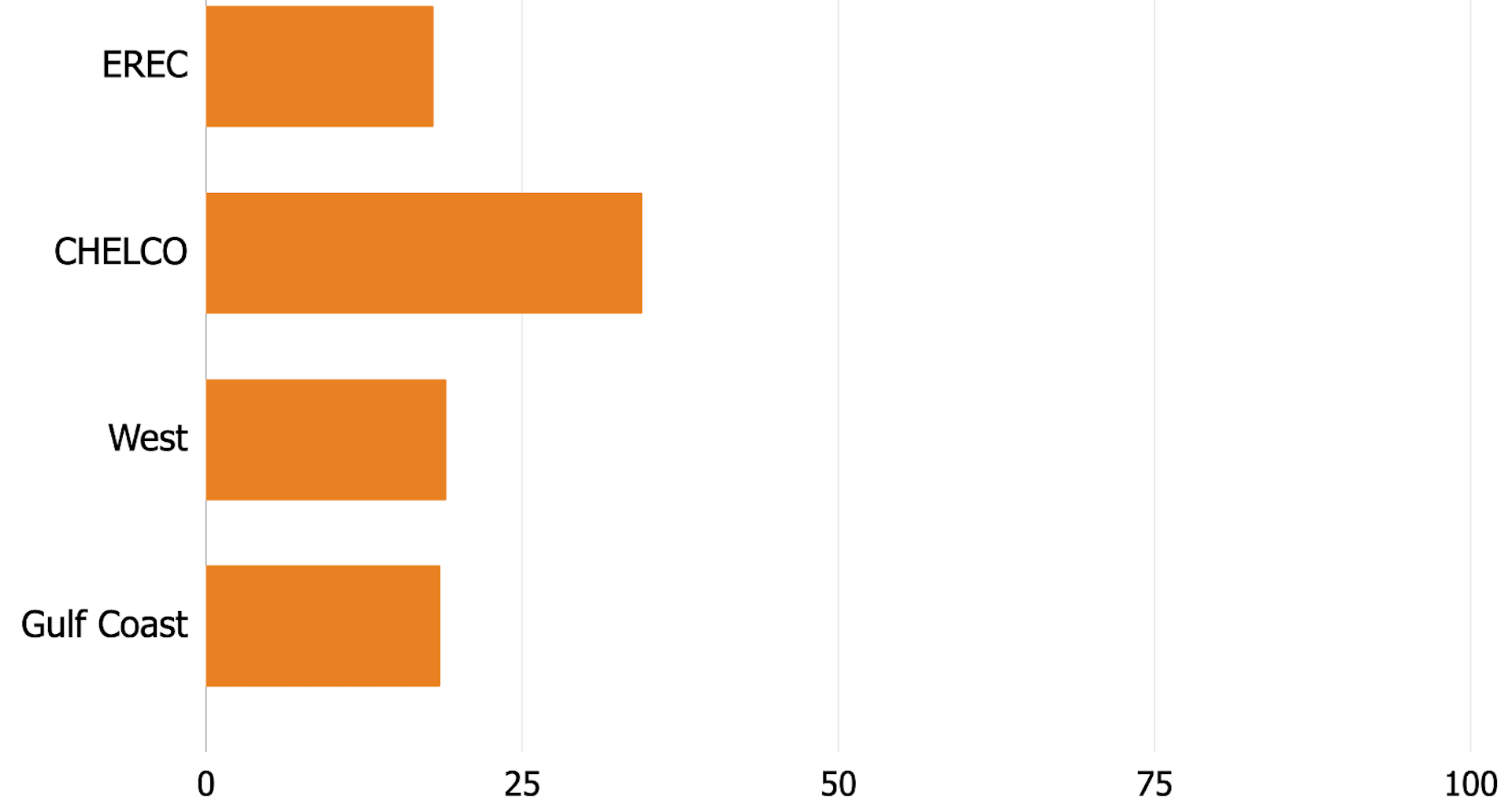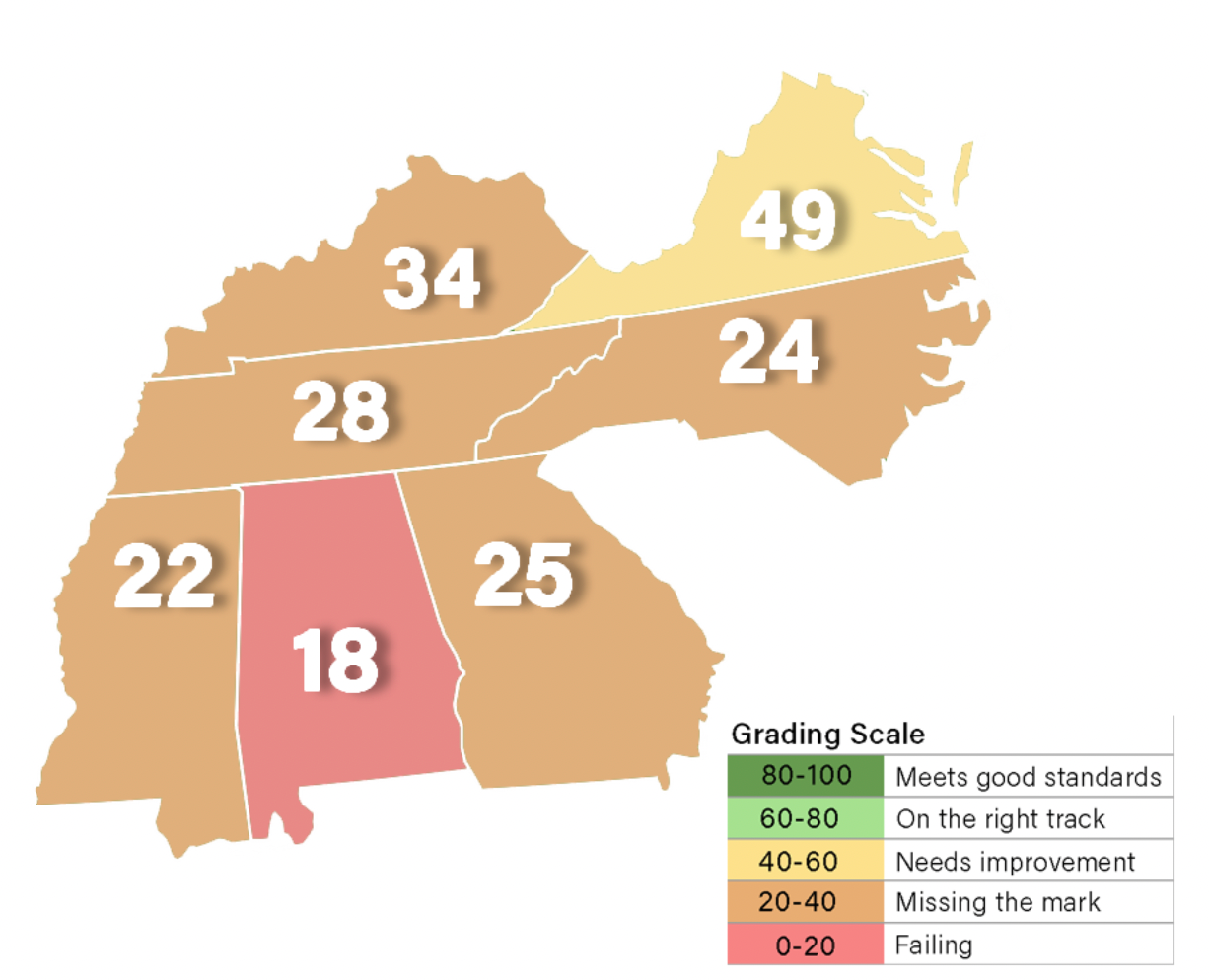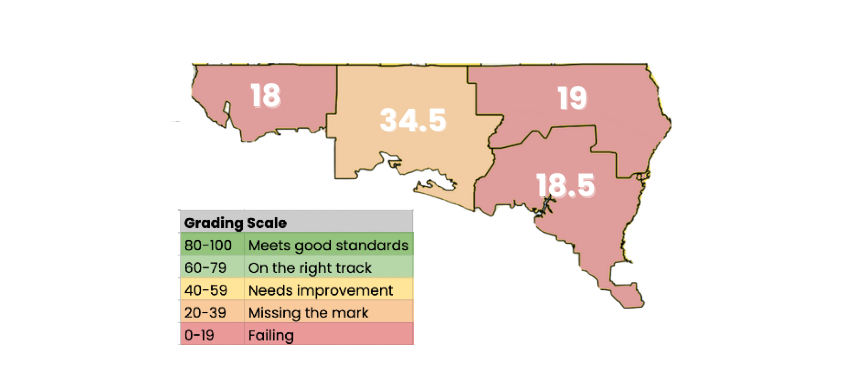Florida panhandle electric co-op scorecard
- Energy democracy & policy

Across four major co-ops in the Florida Panhandle– Escambia River Electric Cooperative (EREC), Choctawhatchee Electric Cooperative (CHELCO), West Florida Electric Cooperative (West), and Gulf Coast Electric Cooperative (Gulf Coast) — member-owner rights, transparency, and solar energy support show serious room for improvement.
Our recommendations aim to strengthen the local economy, increase local energy generation, enhance energy independence, and reduce the peak demand charges paid by the co-op. This helps them uphold key cooperative principles such as concern for community, autonomy and independence, and members’ economic participation.

Key Findings
- Co-ops are not living up to the cooperative principles of democratic member control. Transparency and member access to the Board are severely lacking.
- The Solar Fixed Cost Recovery Charge unjustly penalizes solar member-owners.
- Fixed fees for all member-owners are too high, making electricity more expensive regardless of usage.
Key Recommendations
- Real member participation in Board meetings and elections
- Fair treatment for solar users by:
- 1) Removing the Solar Fixed Cost Recovery Charge
- 2) Providing fair credit for solar shared to the grid
- Lower fixed fees to increase affordability for all members
- Fair credit for solar shared to the grid including incentives for energy shared at peak times
Methodology
- Much of the scoring followed the same methodology used by Energy Democracy Y’all, which created scorecards for other Southeastern states based on a 100-point scale. By these standards, EREC, West, and Gulf Coast are “failing” and CHELCO is “missing the mark.”
- Co-ops are welcome to reach out if there are errors and we will update it accordingly.
Takeaways
Board Meetings and Director Access:
None of the co-ops make board meetings open or accessible. There is no clear information on the logistics to attend, the right of members to attend, or clear procedures for member-owners to speak at meetings. Only West shares board meeting minutes online.
Zero co-ops post direct contact information for their board directors. The only structured member engagement comes in the form of calling special meetings, but there are no other consistent public means or forums for engagement. All co-ops do have their bylaws posted online and explicitly allow members to propose amendments.
Energy Efficiency & Electrification
No co-ops have an energy efficiency on-bill financing program, although EREC and West do offer low-interest loan financing. All co-ops do offer basic support with information on state and federal energy efficiency and electrification programs, energy audit, and rebates.
Solar Policy
Zero co-ops offer community solar programs. Net metering policies result in low credit rates for excess solar generation. Members receive only 3-5 cents per kW, far below the retail rate.
Solar fees are a major problem. EREC and West impose a $4.94/kW Solar Fixed Cost Recovery Charge, and Gulf Coast charges $3.49/kW for systems over 10kW. EREC’s own 2020 data indicated 117 solar owners paying over $68,000 in Solar Recovery Fees.
These fees add significant costs to solar owners, discouraging adoption. Two Federal Energy Regulatory Commission (FERC) commissioners wrote that Alabama Power may be violating federal law under the Public Utility Regulatory Policies Act (PURPA) by having discriminatory solar fees similar to the Solar Fixed Cost Recovery Charge.
EREC, West, and Gulf Coast hide behind the PowerSouth Solar Recovery Fee label, passing off responsibility to the G&T provider while enforcing the charge locally. This misleads members into believing the fee is beyond their co-op’s control. CHELCO, notably, does not impose this charge. If one co-op under the same provider can operate without penalizing solar users, others can too.
Fixed Fees
Fixed monthly customer charges for all member-owners range from $29-$35. This is around three times the national average customer charge for investor-owned utilities of $11.51 (EQ Research 2024).
Support for Vulnerable Members
All co-ops provide some support for members in financial need. EREC and West maintain a medically essential service list, but they do not prevent disconnection.
Recommendations
Board Meetings and Director Access:
- Make board meetings open and accessible by posting meeting times, creating clear procedures for members to speak, and post minutes and/or recordings online.
- Offer public forums for members to communicate directly with the board outside of the annual meeting.
- Post contact info for board members on co-op websites.
- Increase financial transparency by posting IRS Form 990s online.
- Improve voting accessibility by allowing voting in-person, early, by mail, and online.
- Limit board directors to a maximum of 15 years on the board.
Energy Efficiency and Electrification:
- Establish an on-bill financing program for energy efficiency improvements.
Solar Policy
- Create a community solar offering that member-owners can directly own with day 1 savings
- Improve net metering policies to provide a full retail rate credit and ensure fair compensation for solar owners and adherence to state law.
- Remove the Solar Fixed Cost Recovery Charge
Fixed Fees
- Reduce fixed fee to less than $25 per month for all member owners.
- Ensure fixed fees are transparently listed as a separate line item on bills.
Support for Vulnerable Members
- Strengthen medical necessity programs by preventing disconnections for medically vulnerable customers.
- Expand bill assistance programs and resource referrals.
Nationwide Comparison
These four co-ops average a score of 22.5.
Drawing much of our methodology from Energy Democracy Y’all who created scorecards for the other Southeastern States, we can get a general sense of how the panhandle compares.
The Solar Fixed Cost Recovery Charge imposed in the Florida Panhandle sets a dangerous national precedent. If PowerSouth’s anti-solar policies are allowed to take root and go unchallenged here, it could embolden other generation and transmission cooperatives across the country to implement similar tactics. This isn’t just a local policy failure—it’s a warning sign for rural solar adoption nationwide. The scorecard, therefore, is not merely a regional assessment—it’s a clear signal of what could spread if left unchecked.
Energy Democracy Y’all Southeast Scorecard Map

Florida Panhandle Scorecard Map

Get the latest on solar straight to your inbox.
Fight for your solar rights.
Everyone has the right to go solar. Spread the sunshine nationwide and in your local community by taking action, joining events, and more.